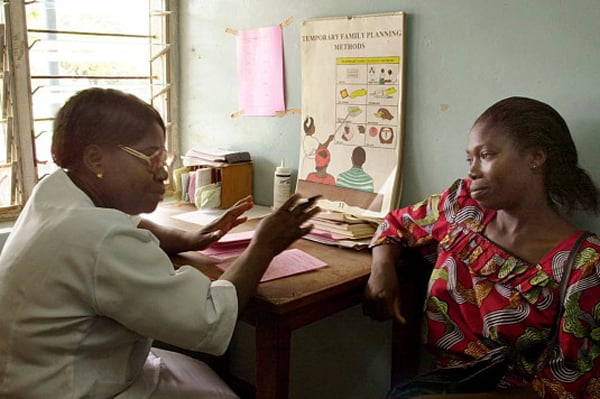BY RIDWAN SORUNKE
With a grossly underfunded health budget and a fast-growing population, Nigeria must prioritize investment in family planning to reap huge economic returns and better health outcomes. In its 2017 projection, the United Nations predicted that Nigeria will have one of the largest populations in the world by 2050. But if its GDP growth rate continues to remain below its population growth rate, Nigeria should expect a gloomy economic condition and strain on its infrastructure in the years to come.
As the country continues to tackle challenges with its expanding population, it must pay attention to its health sector, specifically areas that offer the highest economic return per investment. Family planning, after immunization and nutrition, is identified as the investment package with the most economic return. According to a 2016 World Innovation Summit for Health (WISH) report, family planning and maternal and child health investment will yield between $9-$20 on every dollar invested compared to a $5 return on Malaria and $9 return on Non-Communicable Diseases (NCD).
Investment in family planning is a driver of economic growth, women empowerment, and gender equality. When women have the choice to determine the number of children they want and when to have them, Nigeria will be positioned to reap the demographic dividend. The demographic dividend is the economic growth that results from a decreased ratio of dependents to the working age population. By reducing the dependency ratio, people will live longer, be more productive, have an incentive to save for their retirement, and increase their investments. Families can also have fewer dependents that need social services; healthier and well-nourished children; and a growing workforce that includes more women. When women in developing countries such as Nigeria space their births by at least three years, their babies are almost twice as likely to reach their first birthday. Women are also more likely to advance their education and increase their income over time. Successful family planning therefore leads to better health and social outcomes.
Advertisement
Despite the immense economic and health returns of family planning, contraceptive prevalence in Nigeria remains low. At the London Summit in 2012, Nigeria pledged to achieve 36.6 percent Contraceptive Prevalence Rate (CPR) by 2020 and an annual CPR growth rate of 2 percent; however, its CPR lingers at 24.2 percent for all women and 27.6 percent for married women in 2018 while its unmet contraceptive need was at 16.6 percent. If Nigeria fulfills its FP 2020 commitment of 36 percent CPR, over 20,000 lives of mothers and over 100,000 of children would be saved by 2020. Additionally, by 2050, it would save about 2.2 billion dollars in social costs if it achieves its annual CPR reduction of 2 percent.
As part of its 2012 commitments, Nigeria pledged to allocate 8.35 million dollars annually over four years; however, it failed to deliver on this commitment due to the economic recession of 2016. Currently, Nigeria allocates about $4.6 million to family planning out of its current health budget which represents just 4 percent of the government budget. Its family planning budget is mainly to fund the procurement of contraceptive commodities, train community health extension workers, and provide technical support to the states. Over time, Nigeria has also received counterpart funding from UNFPA, DFID, and USAID. Despite this, Nigeria is still off the mark of sufficient investment in family planning. According to the 2014 Family Planning Blueprint, Nigeria would require approximately US$603 million – $100 million annually between 2013 and 2018 – to achieve its CPR goal of 36 percent.
Nigeria’s current CPR of 24.2 percent shows that there is still a wide gap in knowledge of contraceptives. Only 15 percent of women between 15 and 49 use contraception to limit and space their births. To increase awareness, Nigeria must intensify education and campaign of modern contraceptive methods such as the pill, the intrauterine device (IUD), injectables, implants, male condoms, female condoms, the diaphragm, foam/jelly, the lactational amenorrhea method, and traditional methods including periodic abstinence and withdrawal.
Advertisement
In addition, the country must focus on the delivery of health packages that provide the highest cost-effective interventions – such as family planning – to reap the economic benefits of investment in health. The federal government must leverage a wide range of financing mechanisms such as taxation and mandatory premiums to support investment in family planning. Finally, the government must focus on removing barriers such as policy restrictions, and shortages of trained health personnel that prevent people from using family planning services. Investment in family planning must remain a priority for Nigeria to achieve greater economic and health outcomes.
Sorunke is an MA Candidate in International Economy and International Affairs at the Johns Hopkins University School of Advanced International Studies (SAIS) and policy advisor at ACIOE Associates LLC.
Views expressed by contributors are strictly personal and not of TheCable.
Add a comment






